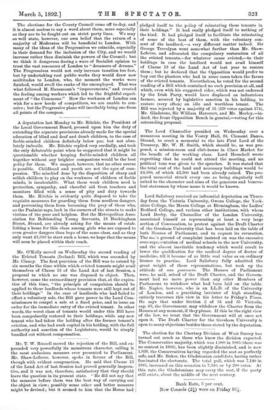Mr. T. W. Russell moved the rejection of the Bill,
and ex- pounded very powerfully its monstrous character, calling it the most audacious measure ever presented to Parliament. Mr. Shaw-Lefevre, however, spoke in favour of the Bill, though with evident compunction. He said that Clause 13 of the Land Act of last Session had proved generally inopera- tive, and it was not, therefore, satisfactory that they should leave the question in its present state. " He did not say that the measure before them was the best way of carrying out the object in view; possibly some other and better measure might be devised ; but it seemed to him that the House had pledged itself to the policy of reinstating these tenants in their holdings." It had really pledged itself to nothing of the kind. It had pledged itself to facilitate the reinstating of some of the best of them, with the voluntary con- sent of the landlord,—a very different matter indeed. Sir George Trevelyan went somewhat further than Mr. Shaw- Lefevre, and advocated the compulsory restoration of all the evicted tenants,—for whatever cause evicted,—to their holdings in case the landlord would not avail himself of Clause 13 of the Land Act of last year to restore them ; but he declared that the Opposition would prefer to buy out the planters who had in some cases taken the farms of the evicted tenants. Nevertheless, he voted for the second reading of a Bill which contained no such provision at all, and which, even with his suggested rider, which was not endorsed by the Irish Party, would have displaced an industrious farmer, secured by legislative sanction in his holding, to restore (very often) an idle and worthless tenant. The Bill was rejected by a majority of 55 (229 votes against 174), Mr. Gladstone, Sir William Harcourt, and Mr. Morley,—in- deed, the front Opposition Bench in general,—voting for this astounding proposal.


































 Previous page
Previous page